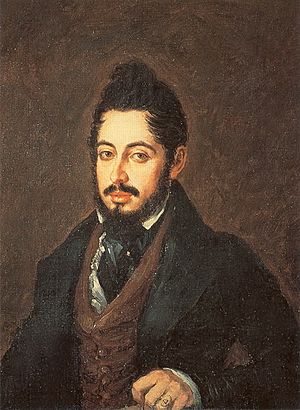Mariano José de Larra facts for kids
Quick facts for kids
Mariano José de Larra
|
|
|---|---|

Portrait by José Gutiérrez de la Vega
|
|
| Born | Mariano José de Larra y Sánchez de Castro 24 March 1809 Madrid, Spain |
| Died | 13 February 1837 (aged 27) Madrid, Spain |
| Occupation | Journalist, novelist, playwright, politician |
Mariano José de Larra y Sánchez de Castro (born March 24, 1809 – died February 13, 1837) was a Spanish writer and journalist. He is best known for his many essays. His writings often used humor and criticism to talk about Spanish society in the 1800s. He focused on both the government and the daily life of people at that time.
Larra became a very important prose writer during the 19th century. He wrote quickly, often worried about censors, but his work never looked rushed. He had a strong sense of politics, many ideas, and a powerful, sharp writing style. Many people believe he would have become one of Spain's most important figures. In 1901, famous writers like Miguel de Unamuno and Pío Baroja honored him by placing flowers on his grave.
Contents
Mariano Larra's Life Story
Mariano José de Larra was born in Madrid, Spain, on March 24, 1809. His father, Mariano de Larra y Langelot, was a doctor in the French Army. Because his father supported the French during their time in Spain (he was an afrancesado), the family had to leave the country in 1812.
In 1817, Larra returned to Spain. He knew more French than Spanish at first! He didn't have a very organized education. After trying but not finishing degrees in medicine or law, he got married at age twenty. This marriage didn't work out well, and he became distant from his family. He then started his career as a journalist.
Early Works and Personal Life
On April 27, 1831, Larra's first play, No más mostrador, was performed. It was based on two plays by other writers. Later, on September 24, 1834, he presented Macías. This play was based on his own historical novel, El doncel de don Enrique el Doliente, which he wrote in 1834.
Mariano Larra married Josefa Wetoret Velasco in 1829. They had three children, but their marriage faced difficulties. Larra later ended his marriage.
In 1833, Larra worked on translating French plays for a theater director named Juan Grimaldi. He also started writing his own plays. This year was also important because he met Dolores Armijo. They began a relationship, even though they were both married to other people.
Journalism and Politics
While his plays and novels were interesting, Larra was mainly a journalist. When the press became freer after the death of King Ferdinand VII, Larra's sharp writing talent had more room to grow. He became famous using the pen names Juan Pérez de Munguía and Fígaro. He used these names in his newspapers El Pobrecito Hablador and La Revista Española.
People in Madrid enjoyed his dark humor. Government ministers were afraid of his critical writing and tried to get him on their side. He supported Liberalism against the Carlist rebellion, which was a civil war in Spain. He was even elected as a representative for Ávila. It seemed like he had a great career ahead of him. However, a time of military takeovers, called pronunciamientos, ruined his personal plans and hopes for Spain.
Later Life and Legacy
Larra became very disappointed with society and politics. This, along with the end of his relationship with Dolores Armijo, made his writing more sad and dark.
On February 13, 1837, Dolores Armijo visited Larra with her sister-in-law. She told him that they could not be together again. Soon after, Larra died. He is buried in the Cementerio de San Justo in Madrid.
Mariano Larra's Influence
Mariano José de Larra's work continues to be important in Spain:
- Some of his famous phrases, like Vuelva usted mañana (meaning "Come back tomorrow") or Escribir en España es llorar (meaning "To write in Spain is to cry"), are still used today to criticize problems in Spain.
- The Spanish version of the internet forum Slashdot, called Barrapunto, uses "Pobrecito Hablador" ("Poor little talker") as the name for people who post anonymously.
- The Premio Mariano José de Larra is an award given to young, talented journalists in Spain.
- The national Museum of Romanticism in Madrid has items related to Mariano José de Larra.
- Many Spanish writers, including Francisco Umbral, Francisco Nieva, Antonio Buero Vallejo, and Juan Eduardo Zúñiga, have written about Larra or included him in their works.
See also
 In Spanish: Mariano José de Larra para niños
In Spanish: Mariano José de Larra para niños
 | Delilah Pierce |
 | Gordon Parks |
 | Augusta Savage |
 | Charles Ethan Porter |

